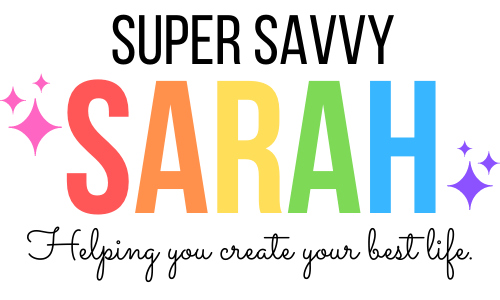For a second, I want you to ignore the title of this post (indicating it’s about kids and screen time). Let me ask you a few questions. Do you have a young child (less than around 8 years old) that:
- Is hyperactive (with or without an ADHD diagnosis)?
- Does not seem interested in playing with toys and won’t play with anything for longer than 5 minutes (unless it has a screen)?
- Has a hard time with personal boundaries (gets too close to others or can’t keep their hands to themself)?
- Has meltdowns over minor things (that don’t seem logical or reasonable)?
- Constantly jumps on furniture and/or is wrestling?
- Is moody?
- Struggles with going to sleep?
- Has a hard time focusing?
- Spends several hours a day watching a screen (cumulative daily time on tv, tablet, phone, Nintendo 3Ds, etc)?
If you found that many of the above questions sound eerily similar to your child’s behavior, then I wrote this post for you. Before we go any further, I do have two more important questions:
- Are you worried that your child might need assistance in school or may need medication in the future?
- Does the idea of taking away screen time from your child terrify you, because you don’t know how you’ll get anything done?
If you answered yes to one or both of the last two questions, then my heart sincerely goes out to you; because a year ago I was you. I know what a tough time that was for me and I hope that I can help you.
For your convenience, this post contains affiliate links from Amazon.com. This means that if you click on a link and make a purchase, I make a small profit at no additional charge to you. You can read my full disclosure policy here.
A few disclaimers:
I want to be very clear that I wrote this post to help a certain parent, not to make anyone feel guilty about letting their kids have screen time.
For the mom out there juggling multiple kids and a newborn, girl you do what you got to do. If you have to turn the TV on for your 3 year old because you need a minute (or a few hours), I understand. I’m not writing this post to make you feel bad.
Additionally, from my discussions with other parents and research of scientific journals, it’s clear that some children are far more sensitive to screen time. These children have more prounounced behavioral changes when exposed to screens. Some children can spend the entire day in front of the tv and exhibit none of the behaviors described at the beginning of this post.
I also am not trying to say that ADHD or related diagnoses aren’t real or that medication shouldn’t be used. Every child is different and eliminating screen time is not a magical cure that works for everyone (but I like to believe can help most).
(Besides eliminating screen time involves no risk – you don’t even need to consult a doctor before giving it a try!)
I’m writing this because in the past year I saw remarkable and amazing changes in my children’s behavior by doing something simple; turning off the screens and strictly limiting them. No one told me to do this, it was something I stumbled upon and had a gut feeling about. Quite honestly, I figured I had nothing to lose.
For parents that are desperately looking for ways to help their kids that are struggling, this post is for you.
Why I started limiting my kids screen time:
In a household with two working parents and no family living close by, we were (and still are) mainly on our own. In the past, I must clearly disclose that I used screen time as a babysitter.
I don’t want to share too many details about my kids past screen time, because that’s a pretty long story and isn’t super relevant. But I do want you to know the story of why I started limiting their screen time in the first place.
When our oldest son turned 1, we started having the TV on pretty consistently, mainly for background noise. Usually it was playing Little Baby Bum, a YouTube channel with kids music.
I think our biggest jump in screen time started about the time that our children got their own tablets at the ages of 2 and 3. When we got them, we intended to mainly use them for travel, but over time we started letting our kids use them more and more. We started to bring them into restaurants with us and they eventually started watching them when they woke up and before going to bed.
As my kids were growing up, it started to become more obvious that they would not play with toys for any considerable amount of time. I bought tons and tons of toys. Lot of different kinds; Legos, Hot Wheels, Thomas the train. I was constantly on the search for the toy that would keep their attention. Nothing worked, they were simply not interested in toys.
I tried to get them to use their imagination, doing things like building forts out of boxes. As soon as the fort was built, they’d ask for their tablets.
I tried getting them to color or paint, it held their attention for mere minutes (and then I had a huge mess to clean up).
Getting my preschool aged boys to focus or play with anything for a significant amount of time was impossible, except when it came to screens.
I had dishes in the sink, piles of laundry, and work to do. I turned on the TV so that I could catch up around the house. By the time my kids were 3 and 4 years old, they were watching between 3-4 hours of screens a day.
In fall of 2020, both of my kids’ preschool teachers came to me expressing concern over my childrens’ behavior. To put it simply, they were hyperactive and disruptive in their classrooms. They couldn’t sit still during circle time or story time. They couldn’t keep their hands to themselves and they were having a hard time staying focused.
At the same time, at home we were seeing a lot of hyperactive and defiant behavior. Even while the TV was on, my boys would be jumping on the couch or wrestling on the floor. We had stopped reading books all together, because they simply could not sit still. We started letting them have their tablets at bed time, because reading was not a calming experience. (At least they would sit still while watching a tablet.) Putting them to bed was taking longer and longer because they couldn’t fall asleep, they were really wound up. Eventually we started using melatonin at bedtime on a daily basis.
To be honest, it was getting to a point where I wasn’t enjoying my kids like I thought I should. I felt like I was spending most of the day trying to get them to stop wrestling and sit still. They were struggling to listen to me about pretty much everything. I would ask what they wanted for breakfast no less than 5 times, they just wouldn’t respond. Getting them dressed and out the door was a chore that took far longer than it should. And I felt like I was that mom that was always yelling at my kids.
At that point, I felt like I was always looking for the next Netflix show that would peak their interest. I remember being excited when I found a toy exercise bike that would sync with their tablets. My oldest son played a learning game on the “exercise bike” for over an hour one day, which was unheard of in our house. Neither of our kids played with any toy for that long. I thought it was awesome (but it was just more screen time.)
The search for a something to help my kids:
I have a PhD in Organic Chemistry and when presented with a problem, perhaps it’s my education, but I see it as a challenge to find a solution. My first instinct about my kids’ behavior at school was that that they had ADHD. So with that in mind, I went to the internet to look for a solution. I figured I had 2-3 years to find something to help them, since most pediatricians don’t typically medicate children for ADHD until age 6.
(That’s a long time to be the problematic child in a classroom. I was already dreading picking up my children from preschool because of the reports I would get about their day.)
The first suggestion the preschool teachers recommended for my sons was to get them each a cube chair and weighted lap pillow, for circle time. The school also started experimenting with various fidget toys and cushions to see if any of them would help my children sit still.
The general result from those items was that they would keep my kids focus for a few minutes at most, but would get less effective as time went on. I was starting to realize that our solution was not likely to be solved by an ‘item.”
After weeks of research in various Facebook groups and on Google, I started to see a consistent topic popping up: screen time could worsen or even induce ADHD behavior in kids, especially younger ones. At that point I fell down the rabbit hole and started reading everything I could get my hands on, involving the use of screen time in young kids.
What Scientific Studies Have Shown about Kids and Screen Time:
There are a number of scientific studies involving kids and screen time. Essentially all of the studies have found the same general conclusion: at best the screen is doing nothing positive for our children.
A few of the studies I thought were most interesting found that:
- Children who consistently watched more than 2 hours of screen time/day were 7.7 times more likely to meet the criteria for ADHD, when compared to peers watching less than 30 minutes a day. (source)
- Screen time decreases melatonin production and decreases quality of sleep. (source)
- 2 month old children who spent more time watching screens and less time interacting with their parents (or a caregiver) were found to have greater associations with autism spectrum disorder behaviors at 2 years old. (source)
- Children less than 3 learn better from live interaction with a caregiver in comparison to a screen (source)
I was surprised that many of these studies related to the observations we had with our children, especially the hyperactivity and struggles with sleep.
What I did about my kids and screen time:
After reading the available research, I did something I was terrified to do, I detoxed my kids from screens. I still remember telling my husband that I was thinking about doing a screen detox. I think he was skeptical that removing screens could have such a significant effect on their behavior, but we had nothing to lose, there was no risk. If we removed screens and their behavior didn’t change, we were out nothing. We could always turn the screen back on in a week or 2.
We were very worried about how our children would respond to taking away the screen and I was equally worried about how I was going to get anything done. The TV had been the only way I could do household chores. Remember, my kids didn’t play with toys, but loved wrestling. (In fact, I usually turned on the TV when I was sick of their wrestling.)
One morning when the boys woke up, I told them that the tablet fairy had taken their tablets. I also told them that we weren’t going to watch tv for awhile.
Initially they were really upset, they kept asking to watch tv and there were some tears. But after 2-3 days, they completely stopped asking.
And after removing the screen for about a week, the really amazing things started to happen.
My oldest son started to get astonishingly calmer (for anyone who knows him, you’ll understand). He sat down one night and wrote Valentine’s cards to all his classmates. He wrote each classmates’ name and his own name on each of the cards. He sat at the kitchen table filling out those Valentine’s Day cards for maybe 30-45 minutes. I was practically in tears I was so happy. I had never seen my son so focused and so calm.
The meltdowns also started decreasing, to the point that it would be hard to remember the last one. Their tempers started to even out and they started wrestling less.
Both of my children started independently playing with toys and doing things like puzzles and color by numbers.
One special moment I remember was when they started singing in the car one day. They had literally never sang along to music in the car before.
They started enjoying being read to (and being able to sit still for that long). I can still remember the day that I read several books to them, back to back. I was astonished because we hadn’t read been able to read any books for so long.
A few months after we removed screens from their lives, we were able to wean them off of melatonin.
And ultimately, I started to really enjoy being a parent and enjoy spending time with them. The changes that we saw from removing screens were practically miraculous. Taking away the screens gave my children back their imaginations and took away so many of their negative emotions.
If you’re curious how I keep my kids entertained without screens, here’s a list of some of my favorite screen-free activities.
Some random thoughts:
I can’t make you any promises, but if the questions at the beginning of this post resonated with you, then I would strongly encourage you to do a screen detox and see what happens. As I’ve said, there is no risk and you have nothing to lose. Worst case scenario, it doesn’t change your child’s behavior at all and you reintroduce the screens. But what if it does help you child? What if you see the changes that I’ve seen, by simply turning off the screen?
I want to be honest and let you know that we haven’t completely banned screens in our house. I would say we are a “screen limited” house. When our kids are off the screen, their behavior tends to be really amazing (especially when compared to where we were last year). It makes it easy to waiver and let them watch TV.
I’ve experimented with letting them watch an hour a day of shows like Sesame Street. After several days, my kids always get to a tipping point where they’ve watched too much, and their old behaviors will start back up. That’s when we start the detox process over again.
Right now they probably watch about an hour of TV a week. I’m currently working from home and on occasion, have Zoom meetings. During that time, I do typically turn on the TV and a lot of the time, we pay for it the rest of the day.
For us, it doesn’t seem to matter what kind of content is on the screen. FaceTime, Sesame Street, and educational apps all have the same effect on their behavior. It does seem that phones and tablets have a more significant effect than the TV. I think its because kids have more “control” with phones and the screens are closer to their eyes. A flick of a finger can change the show, the volume, or fast forward it. With the TV, they are further away and there’s no sense of power from controlling it via touch.
We’ve talked to several friends and neighbors about our observations and a shocking number have shared nearly identical stories. One friend said his child knew how to use an iPad before he could walk. Many people have expressed their current struggle with virtual learning leading to behavioral changes.
I sincerely believe that all screen time has a negative effect on my children; there is no “good” screen time for them. During this pandemic, I have tried every educational app (Homer, Reading Eggs, even Mightier).
The content on the screen doesn’t seem to matter. If your child is negatively effected by screens; all screen time seems to negatively effect their behavior (and I do believe that video games and more violent and stressful content magnifies the effect.)
Final thoughts:
I want to reiterate that my intention for writing this article was to help parents like me, that are looking for ways to help their kids (before considering medication).
Before considering an expensive, inconvenient and possibly risky treatment for your child, I would like to challenge you to take away the screens for 2 weeks. It may seem impossible, but give it 2 weeks and see what happens.
What if it helps them? Wouldn’t it be awesome if you could avoid giving your child medication for ADHD by simply turning off screens? Would it be worth it if they might finally start to play with their toys and stop asking for tv?
One of my biggest motivators in our journey of being a “screen-limited” household was reading this book. It’s written by an MD who shares a lot of her experiences in helping children detox from screens. She summarizes a lot of scientific studies and interesting facts, regarding the increasing number of ADHD and bipolar diagnoses in the last 20 years. If you are looking for more information, I would strongly recommend you check it out.
At this point, you might be overwhelmed and terrified. That’s exactly how I felt last year. But I am hear to tell you that it may seem terrifying to turn off the tv and take away your child’s devices, but I want you to know that it is worth it.
If you decide to embark on this journey, I want you to know that I am here for you, in fact, I was you in February of 2020. And starting on this journey was terrifying, but literally changed our lives.
If you have any questions, please don’t hesitate to reach out. I am not a psychologist and am by no means an expert. But I am a parent who knows how scary it was to turn off the screens, but I also know about the amazing changes that started happening.
Stay savvy,


Wish your day-to-day was less chaotic?
The journey to a less stressful household starts with a single step. Getting all your login information organized is a GREAT first step. (Seriously – don’t underestimate the power of this small task!)
Sign up for this FREE challenge to get an eBook to guide you through this process and the worksheet that will whip your login information into shape!







